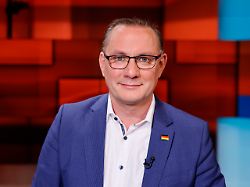“Tough but fair” to Germany
Chrupalla for an absolute AfD majority in the East
By Marko Schlichting
September 26, 2023, 3:09 a.m
Listen to article
This audio version was artificially generated. More info | Send feedback
Despite problems that urgently need to be solved, a new self-confidence is developing in eastern Germany. That is the impression of the guests in the ARD program “Hart aber fair” on Erste after 33 years of reunification. The AfD chairman Chrupalla calls this love of homeland.
Every year, shortly before German Unity Day, the talk shows on ARD and ZDF discuss the situation in East Germany. That is also the case this year. But something seems to be changing in the eastern German states. Although many East Germans still feel like second-class citizens, a new self-confidence can sometimes be observed. The term “East German” no longer only has negative connotations. You get that feeling when you listen to the guests on the ARD talk show “Hart aber fair” in the evening, most of whom come from eastern Germany. The head of the East Germany editorial team at “Zeit”, Anne Hähnig, explains it like this: “Back then, after reunification, there was the illusion that East and West would grow together very quickly, that it would take a few years until the East could catch up on economic growth, that the West was able to experience. Today we realize that this is not the case, but that a few differences still exist. And I think that with the disappointment of this has also come a stronger identification with the East, which was the case some ago years ago.”
In fact, politicians like the CDU parliamentary group leader in the Thuringian state parliament, Mario Voigt, or the AfD co-chair Tino Chrupalla say they feel like East Germans. Voigt sees himself first and foremost as a Thuringian, Chrupalla says clearly: “I am proud to be East German.” But he also always loved Germany. “We have not been weaned off patriotism, but also love of our homeland in the GDR,” said Chrupalla.
“Many people are currently reminded of the GDR”
Although the clichés about East Germans have diminished in recent years, says Chrupalla, many East Germans with GDR experience have been experiencing déjà vu again and again recently, especially in current politics. “Many people feel reminded of the GDR,” says Chrupalla. He cites the discrediting or exclusion of his own party as an example. “My account at Postbank was canceled on Friday because I am an AfD member,” he claims. According to the AfD chairman, one is no longer allowed to freely express one’s own opinion in public in Germany.
Bundestag Vice President Katrin Göring-Eckardt from the Greens sees it differently. “You can express your opinion, anywhere, every day. And in fact, we have to listen to it every day in this free country. It’s completely silly to say that you’re not allowed to do that.” It’s different in a dictatorship like the former GDR. “You say one wrong sentence and you’re in prison or somewhere. That’s the relevant difference between dictatorship and democracy.”
Thuringia: No cooperation between CDU and AfD
In recent weeks there has been harsh criticism of the CDU in Thuringia after it, together with the FDP and AfD, brought a law to reduce the real estate transfer tax through the state parliament. While Chrupalla speaks of pragmatism, Voigt explains that it was a CDU law that was rejected by the red-red-green minority government for two years. “In Thuringia we have a special situation. We have a minority coalition, and that also means that everyone has to deal with it responsibly.” The CDU wanted to reduce the real estate transfer tax that applies when buying a property to the usual German level, and that was responsible.
Chrupalla sees it similarly. The AfD will always agree to the laws of other parties when it comes to the interests of citizens. In Thuringia, the property transfer tax is twice as high as in Bavaria, says Chrupalla. “We voted for a reduction, and that will benefit all Thuringians.” Of course, there are discussions between the parties before every vote, and that is why there were previously discussions between the CDU and the AfD. That’s absolute nonsense, Voigt defends himself: “We don’t talk to the AfD.” There is also no cooperation, neither with the AfD nor with the Left. And what’s more, the minority government of the Left, SPD and Greens had already worked with the AfD and no one was upset about that.
That’s correct. At the end of April, the red-red-green Thuringian minority government, with the votes of the AfD, set up a committee of inquiry to look into alleged nepotism in the appointment of state secretaries in the current and previous state governments. At least not a law, but still an important decision.
Next vote on the “correct language law”
The CDU in Thuringia will soon have another vote in which they will need the AfD MPs. She wants to ban gendering in schools with a “correct language law”. But if it really came down to it, the CDU’s firewall would be in favor of the AfD, suggests Voigt. A new state parliament will be elected in his federal state next year, and the AfD could become the strongest party there according to recent polls. “I would not let the AfD tolerate me as a possible prime minister,” promises Voigt.
Chrupalla doesn’t really care about that at first. He has a different goal. “You will see election results in East Germany, where the question may no longer arise for us as to whether we even need a coalition partner. That is our motivation.”
